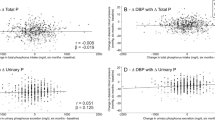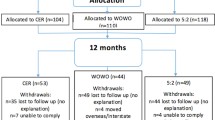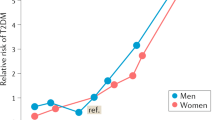Abstract
Randomized trials have shown significant blood pressure (BP) reductions after increased protein compared with carbohydrate intake, but the effect on BP maintenance after initial weight loss is unclear. We examined the effect of a high-protein diet on the maintenance of reduced BP after weight loss in 420 overweight adults from the Diet, Obesity and Genes study. After an 8-week weight-loss period (>8% BW), subjects (42±6 years) were randomized to either a high-protein diet (23–28 en% protein) or a lower-protein control diet (10–15 en% protein) for 26 weeks. BMI after weight loss was 30.3±4.3 kg m−2, BP was 118/73 mm Hg and 28 subjects (6.5%) used antihypertensive agents. Systolic BP during 26 weeks of weight maintenance dietary intervention increased in both treatment groups, but it was 2.2 mm Hg less (95% CI: −4.6 to 0.2 mm Hg, P=0.08) in the high-protein group than in the lower-protein control group. In 191 (pre)hypertensive subjects (baseline systolic BP⩾120 mm Hg), a larger difference was observed (−4.2 mm Hg (−7.7, −0.7), P=0.02). The effect was attenuated after adjustment for initial BP (−3.4 mm Hg (−6.9, −0.03), P=0.048), and after additional adjustment for weight change (−2.7 mm Hg (−6.1, 0.4), P=0.11). Adjustment for 24-h urinary excretion of sodium and potassium did not change the results. Diastolic BP yielded similar results. These findings suggest that a BP reduction after weight loss is better maintained when the intake of protein is increased at the expense of carbohydrates. This effect is partly mediated by body weight.
This is a preview of subscription content, access via your institution
Access options
Subscribe to this journal
Receive 12 digital issues and online access to articles
$119.00 per year
only $9.92 per issue
Buy this article
- Purchase on Springer Link
- Instant access to full article PDF
Prices may be subject to local taxes which are calculated during checkout

Similar content being viewed by others
References
Ezzati M, Lopez AD, Rodgers A, Vander Hoorn S, Murray CJ and Comparative Risk Assessment Collaborating G. Selected major risk factors and global and regional burden of disease. Lancet 2002; 360: 1347–1360.
Appel LJ, Brands MW, Daniels SR, Karanja N, Elmer PJ, Sacks FM . Dietary approaches to prevent and treat hypertension: a scientific statement from the American Heart Association. Hypertension 2006; 47: 296–308.
Whelton PK, He J, Appel LJ, Cutler JA, Havas S, Kotchen TA et al National High Blood Pressure EducationProgram Coordinating Committee. Primary prevention of hypertension: clinical and public health advisory from The National High Blood Pressure Education Program. JAMA 2002; 288: 1882–1888.
Appel LJ, Sacks FM, Carey VJ, Obarzanek E, Swain JF, Miller 3rd ER et al. OmniHeart Collaborative Research Group. Effects of protein, monounsaturated fat, and carbohydrate intake on blood pressure and serum lipids: results of the OmniHeart randomized trial. JAMA 2005; 294: 2455–2464.
Brinkworth GD, Noakes M, Keogh JB, Luscombe ND, Wittert GA, Clifton PM . Long-term effects of a high-protein, low-carbohydrate diet on weight control and cardiovascular risk markers in obese hyperinsulinemic subjects. Int J Obes Relat Metab Disord 2004; 28: 661–670.
Delbridge EA, Prendergast LA, Pritchard JE, Proietto J . One-year weight maintenance after significant weight loss in healthy overweight and obese subjects: does diet composition matter? Am J Clin Nutr 2009; 90: 1203–1214.
Larsen RN, Mann NJ, Maclean E, Shaw JE . The effect of high-protein, low-carbohydrate diets in the treatment of type 2 diabetes: a 12 month randomised controlled trial. Diabetologia 2011; 54: 731–740.
Leidy HJ, Carnell NS, Mattes RD, Campbell WW . Higher protein intake preserves lean mass and satiety with weight loss in pre-obese and obese women. Obesity (Silver Spring) 2007; 15: 421–429.
Meckling KA, Sherfey R . A randomized trial of a hypocaloric high-protein diet, with and without exercise, on weight loss, fitness, and markers of the metabolic syndrome in overweight and obese women. Appl Physiol Nutr Metab 2007; 32: 743–752.
Larsen TM, Dalskov S, van Baak M, Jebb S, Kafatos A, Pfeiffer A et al. The diet, obesity and genes (Diogenes) dietary study in eight European countries—a comprehensive design for long-term intervention. Obes Rev 2010; 11: 76–91.
Larsen TM, Dalskov SM, van Baak M, Jebb SA, Papadaki A, Pfeiffer AF et al Diet, Obesity, and Genes (Diogenes) Project. Diets with high or low protein content and glycemic index for weight-loss maintenance. New Engl J Med 2010; 363: 2102–2113.
Gogebakan O, Kohl A, Osterhoff MA, van Baak MA, Jebb SA, Papadaki A et al DiOGenes. Effects of weight loss and long-term weight maintenance with diets varying in protein and glycemic index on cardiovascular risk factors: the diet, obesity, and genes (DiOGenes) study: a randomized, controlled trial. Circulation 2011; 124: 2829–2838.
Moore CS, Lindroos AK, Kreutzer M, Larsen TM, Astrup A, van Baak MA et al DiOGenes. Dietary strategy to manipulate ad libitum macronutrient intake, and glycaemic index, across eight European countries in the Diogenes Study. Obes Rev 2010; 11: 67–75.
Baecke JA, Burema J, Frijters JE . A short questionnaire for the measurement of habitual physical activity in epidemiological studies. Am J Clin Nutr 1982; 36: 936–942.
Altorf-van der Kuil W, Engberink MF, Brink EJ, van Baak MA, Bakker SJ, Navis G et al. Dietary protein and blood pressure: a systematic review. PLoS ONE 2010; 5: e12102.
He J, Wofford MR, Reynolds K, Chen J, Chen CS, Myers L et al. Effect of dietary protein supplementation on blood pressure: a randomized, controlled trial. Circulation 2011; 124: 589–595.
Teunissen-Beekman KF, Dopheide J, Geleijnse JM, Bakker SJ, Brink EJ, de Leeuw PW et al. Protein supplementation lowers blood pressure in overweight adults: effect of dietary proteins on blood pressure (PROPRES), a randomized trial. Am J Clin Nutr 2012; 96: 966–971.
Claessens M, van Baak MA, Monsheimer S, Saris WH . The effect of a low-fat, high-protein or high-carbohydrate ad libitum diet on weight loss maintenance and metabolic risk factors. Int J Obes (Lond) 2009; 33: 296–304.
Westerterp-Plantenga MS, Lejeune MP, Nijs I, van Ooijen M, Kovacs EM . High protein intake sustains weight maintenance after body weight loss in humans. Int J Obes Relat Metab Disord 2004; 28: 57–64.
Neter JE, Stam BE, Kok FJ, Grobbee DE, Geleijnse JM . Influence of weight reduction on blood pressure: a meta-analysis of randomized controlled trials. Hypertension 2003; 42: 878–884.
Cirillo M, Lombardi C, Laurenzi M, De Santo NG and Gubbio Study Research G. Relation of urinary urea to blood pressure: interaction with urinary sodium. J Hum Hypertens 2002; 16: 205–212.
Acknowledgements
The DiOGenes project (http://www.diogenes-eu.org) is funded by a grant from the European Union Food Quality and Safety Priority of the Sixth Framework Program (contract no. FP6-2005-513946). DiOGenes is supported by the European Community (contract no. FOOD-CT-2005-513946). The writing of this report and the determination of 24-h urinary sodium and potassium excretion was funded by Top Institute (TI) Food and Nutrition (project number A-1003), Wageningen, The Netherlands. TI Food and Nutrition is a public/private partnership that generates vision on scientific breakthroughs in food and nutrition, resulting in the development of innovative products and technologies (www.tifn.nl). Partners are major food companies and Dutch research organizations.
Author information
Authors and Affiliations
Corresponding author
Ethics declarations
Competing interests
The authors declare no conflict of interest.
Additional information
Supplementary Information accompanies this paper on the Journal of Human Hypertension website
Supplementary information
Rights and permissions
About this article
Cite this article
Engberink, M., Geleijnse, J., Bakker, S. et al. Effect of a high-protein diet on maintenance of blood pressure levels achieved after initial weight loss: the DiOGenes randomized study. J Hum Hypertens 29, 58–63 (2015). https://doi.org/10.1038/jhh.2014.30
Received:
Revised:
Accepted:
Published:
Issue Date:
DOI: https://doi.org/10.1038/jhh.2014.30
This article is cited by
-
Dissociation Between Long-term Weight Loss Intervention and Blood Pressure: an 18-month Randomized Controlled Trial
Journal of General Internal Medicine (2021)
-
Impact of Nutritional Epigenetics in Essential Hypertension: Targeting microRNAs in the Gut-Liver Axis
Current Hypertension Reports (2021)
-
Effects of soy protein isolate hydrolysates on cholecystokinin released by rat intestinal mucosal cells and food intake in rats
Journal of Food Science and Technology (2020)
-
Effects of Different Weight Loss Approaches on CVD Risk
Current Atherosclerosis Reports (2018)
-
The role of higher protein diets in weight control and obesity-related comorbidities
International Journal of Obesity (2015)



